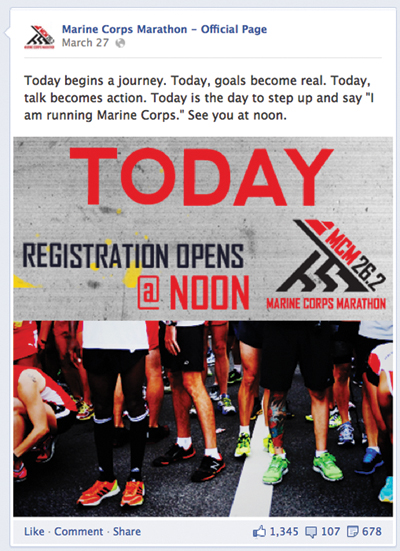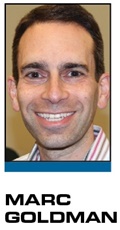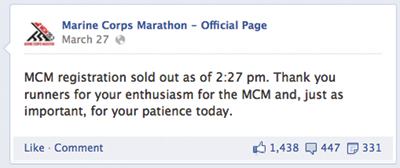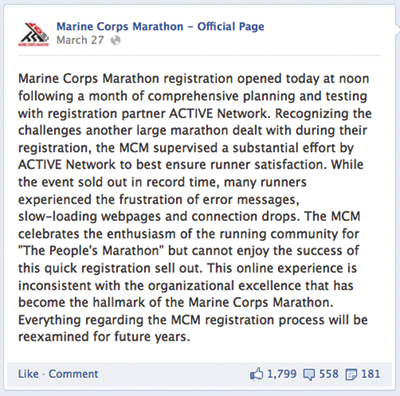Whether a three-hour baseball game or a five-hour marathon, consumer engagement can be considerably more limited on-site than it is online before, during and after actual attendance or participation in a sporting event. Therefore, dedicated planning and thoughtfulness must be put into crafting the social media personality of an event as a way to maintain a relationship and relevance. The tone and timing of tweets, posts and images need to be honest and provocative, stretching communication practices beyond one-dimensional news dissemination.
In the best of circumstances, these tools facilitate the dissemination of information, generate enthusiasm and dialogue, and, as recent events have necessitated, serve as an instrument in reinforcing force protection/security policies. In uncertain times, when events are confronted with unexpected challenges or unplanned influences, these assets offer a streamlined channel of communication to the end user, enabling events to educate, inform, assist or empathize.
At the Marine Corps Marathon, the social media mission is to maintain meaningful dialogue and sustain the excitement and motivation individuals have during the annual planning, training and celebrating cycle. This was never more evident than on March 27, when record-breaking registration experienced significant technology failures.
 |
The MCM’s annual calendar is highlighted by two days of mass interaction: registration and execution. In recent years, the time necessary to fill the 30,000 spots for the third-largest U.S. marathon has streamlined from weeks to days to less than three hours in 2012. The speed with which last year’s registration sold out was largely credited to an effective ongoing dialogue during the months between the event and the opening of registration that seemingly whipped an already enthusiastic online running community into frenzy. A similar promotional approach was enacted this year by talking about New Year’s resolutions in early January, posting motivation and Marine Corps-themed countdowns, and responding to and sharing in the runner-generated energy to keep everyone focused on what has become a de facto
holiday in the running world.
Runners posted that they were memorizing credit card numbers, employing multiple technology devices, and taking a day off work to be at their computers and gain every possible advantage to secure
entry in what promised to be another record-breaking sellout.
As the days leading to registration approached, MCM Facebook posts began escalating, with thousands of likes, hundreds of shares, and comments expressing a dual emotion of excitement and nervous anticipation. Runners shared that getting into the event might actually be more challenging than running it — and this proved to be prophetic, as the masses converged on the website when registration opened. The registration platform put up a good fight for about 90 seconds before system failures began to erupt.
A lava-hot flow of frustration, anger and confusion descended on the MCM Facebook page, our fickle friend. As organizers, we were in communication with the platform administrators who offered various explanations but couldn’t solve problems fast enough. Therefore, it becomes necessary, when in the face of great public outcry, to employ the full power of social media and simply communicate by following these basic precepts:
■ Be present
It is impossible to hide from Facebook as consumers fill the space with messages seeking help and understanding or simply to vent. They know the organizers are monitoring. As soon as a problem is identified and builds in credibility and scope, a message must be delivered. As MCM staff and the registration company collaborated to understand and diagnose the technical shortcomings, the social media coordinator thoughtfully responded to individual tweets with encouragement and as much relevant guidance as available at a given time. On Facebook, would-be runners read several short, carefully drafted posts intended to establish the event’s awareness of the circumstances. Additionally, many runners received individual responses to posts that were determined to be beneficial to the ongoing conversation. The MCM’s consistent messaging was lauded in online registration-related news coverage and applauded by runners. One story went so far as to timestamp each of the event’s tweets in the retelling of the episode.
■ Be honest
Incomplete isn’t bad. The registration situation was dynamic, and rather than delay responding in hopes of arriving at concrete answers, we accepted the approach that our messages would evolve. This type of communication established the true connection that we, organizers and participants, were in this together.
■ Be transparent
No organization wants its customers to experience anything less than a successful interaction with the brand. The registration frustration was considerable for runners but truly disappointing for organizers, who supervised a month of thorough testing intended to avoid such a meltdown. Acknowledging the emotions expressed through social media, sharing the organization’s feelings, and explaining everything that can be explained goes a long way in diffusing a volatile situation.
In the end, the MCM registration still broke the record by 14 minutes, selling out in just two hours and 27 minutes. While this was not a victory the organization felt like celebrating, ultimately we did win the day by turning the online sentiment from, “You know, if you are going to build excitement with countdowns and constant updates, you really ought to be ready for the resulting traffic,” to “Your responses to yesterday’s difficulties registering actually make me want to run the race more now than I did before. I’m very impressed.”
Marc Goldman (marc.goldman@usmc.mil) is sponsorship and marketing manager for the Marine Corps Marathon.







